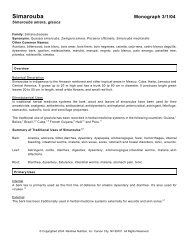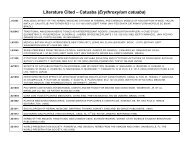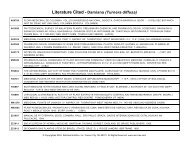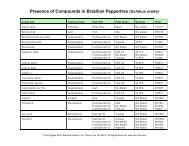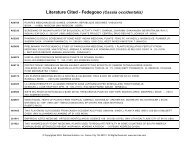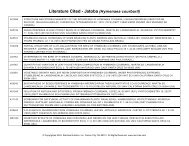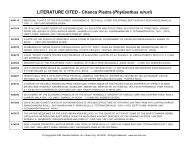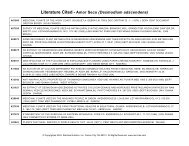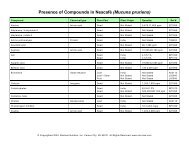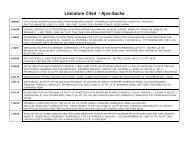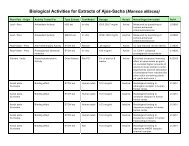Organ Specific Guide - Raintree Nutrition, Inc
Organ Specific Guide - Raintree Nutrition, Inc
Organ Specific Guide - Raintree Nutrition, Inc
Create successful ePaper yourself
Turn your PDF publications into a flip-book with our unique Google optimized e-Paper software.
AMAZON BOWEL SUPPORT<br />
Description: A synergistic formula of 7 rainforest botanicals traditionally used in South America for bowel<br />
function.<br />
Traditional uses by organ or system: Digestive/Elimination: For colitis, Crohn’s, leaky gut, irritable<br />
bowel syndrome, ulcerative colitis, chronic constipation, and diverticulitis.<br />
Ingredients: A proprietary blend of cat’s claw (Uncaria tomentosa), macela (Achyrocline satureoides),<br />
boldo (Peumus boldus), simarouba (Simarouba amara), jurubeba (Solanum paniculatum), tayuya<br />
(Cayaponia tayuya), and anamu (Petiveria alliacea).<br />
Suggested Use: Take 2-3 capsules three times daily on an empty stomach.<br />
Contraindications:<br />
• Not to be used during pregnancy or while breast-feeding.<br />
• This product should not be used with medications intended to suppress the immune system.<br />
Drug Interactions: May potentiate blood thinning medications such as coumadin. May reduce the effect<br />
of immune suppressants.<br />
Other Practitioner Observations and Possible Precautions:<br />
• Several plants in this formula contain a low concentration of coumarin which has an anticoagulant effect.<br />
People with blood disorders such as hemophilia should be monitored more closely.<br />
• Cat’s claw and jurubeba have been documented to have an antifertility effect. Those seeking to become<br />
pregnant or those undergoing treatment for infertility should not use this formula.<br />
Synopsis of research: (Please the online Tropical Plant Database for all cited research.)<br />
• Cat’s claw has been traditionally used as a bowel cleanser and anti-inflammatory for Crohn's, colitis,<br />
diverticulitis, irritable bowel syndrome (IBS), and other bowel problems; as well as for stomach ulcers and<br />
ulcerative colitis and as an ulcer preventative, stomach and bowel protector.<br />
• Macela has been reported in several animal studies with mice and rats, to possess analgesic, antiinflammatory,<br />
and smooth-muscle (gastrointestinal) relaxant properties internally without toxicity, in<br />
addition to anti-inflammatory and analgesic actions externally. This may explain why macela has long<br />
been used effectively for many types of pain, gastrointestinal difficulties, menstrual cramps, and asthma.<br />
• Boldo’s main active chemical, boldine, has shown in animal studies to provide anti-inflammatory and<br />
antispasmodic action, as well as the ability to protect against colon damage and inflammation in induced<br />
colitis and colon inflammation. A recent human study demonstrated that boldo relaxes smooth muscle<br />
tissue and prolongs intestinal transit.<br />
• The Merck Institute reported that simarouba was 91.8% effective against intestinal amebas in humans<br />
in a 1944 study and, in 1962, other researchers found that simarouba showed active anti-amebic<br />
activities in humans. In the 1990s scientists again documented simarouba's ability to kill the most<br />
common dysentery-causing organism, Entamoeba histolytica, as well as two diarrhea-causing bacteria,<br />
Salmonella and Shigella.<br />
• Jurubeba has been reported with antiulcer activity. In animal studies it was reported to inhibit gastric acid<br />
secretion induced by stress and various chemical agents, as well as prevented gastric lesions from<br />
developing. Additionally it was reported to inhibit gastric acid secretion in mice with the ulcer-causing<br />
bacteria H. pylori. Researchers summarized: "Collectively, the results validate folk use of Solanum<br />
paniculatum plant to treat gastric disorders."<br />
• Tayuya is traditionally used by natural health practitioners in the United States for irritable bowel<br />
syndrome, dyspepsia and sluggish digestion, neuralgia, sciatica, gout, headaches, and rheumatism.<br />
• Anamu has been documented in various studies over the years with antimicrobial, analgesic, anti-inflammatory,<br />
antiprotozoal, and immune stimulant actions.



